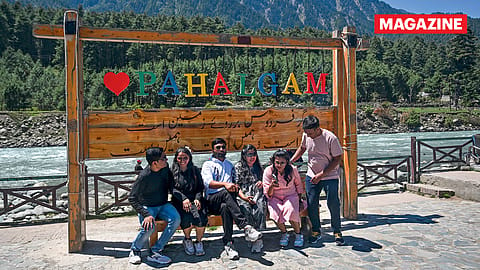Pahalgam terror attack: Kashmir's tourism sees a big dip, but locals remain hopeful for a revival
The terror attack has taken the sheen off Kashmir’s tourism business — but locals are hopeful of a revival.

This story belongs to the Fortune India Magazine May 2025 issue.
IN THE LUSH, pine-scented valley of Pahalgam, where tourists once queued for treks and trout fishing, silence hangs heavy. “Kashmiris [directly] bear no fault for the tragedy, yet it’s the local vendors who will shoulder the economic fallout of declining tourism,” says Shaila, a tour operator. For over a decade, she has watched Kashmir slowly reclaim its place on India’s travel map. But on April 22, a terror attack that claimed the lives of 26 tourists has dealt a blow. “Just 10–20% of flight bookings are still active,” says Sandeep Pandita, an official with Srinagar International Airport. In Srinagar, hotel lobbies are deserted, houseboats lie empty on the Dal Lake, and tourist chatter has given way to uncertainty.
Cancellations for Kashmir-bound travel have soared. “80-90% of our bookings for May and June are gone,” says Varnika Chawla, founder of Trail The Himalayas, a company that curates bespoke travel experiences in the valley.
For the local economy, the blow couldn’t have come at a worse time. This is usually when Kashmir sees around one-third of its total annual tourists. In FY25, J&K’s real Gross State Domestic Product (GSDP) stood at ₹1.45 lakh crore. Of this, tourism directly contributed around 7%, or approximately ₹18,550 crore, according to chief minister Omar Abdullah’s Budget speech. When factoring in allied services — hotels, transport, communication, trade, and food services — tourism’s indirect economic footprint balloons to nearly 29% of the GSDP, or ₹41,615 crore.
In a region where nearly 90% of industrial employment is driven by MSMEs, many of which depend heavily on seasonal tourist traffic, countless livelihoods are at risk. “The youth in Kashmir had made huge investments in the last one year seeing the growing demand, be it guides or local vendors or homestays, but now, with demand dropping massively, these are expected to be severely impacted,” says Gohar Rafiee, an official with J&K’s tourism department. “Some drivers took loans expecting a bumper tourist season… With bookings wiped out, they’re staring at defaults,” says Shaila.
The impact on infra
Tourism isn’t the only sector that has been hit. Kashmir has been at the centre of infrastructure development by the Union government in the past four to five years, witnessing a slew of connectivity projects across railways, highways, tunnels, ropeways and in sectors such as power and hospitality, among others. According to the Ministry of Statistics and Programme Implementation, the Centre is implementing about 50 projects with a capital cost of ₹76,000 crore.
The Narendra Modi-led government’s Kashmir outreach is based on ending its socio-economic alienation, with infrastructure being the core strategy. The Pahalgam attack, say experts, is meant to undermine India’s efforts and thwart economic development of the region. The attack will likely delay a key rail connectivity project — the Vande Bharat Express from Katra to Srinagar, which will provide high-speed connectivity between New Delhi and Srinagar.
More Stories from this Issue
Road connectivity, too, has been a key initiative in recent years. The Centre is developing a 670-km Delhi-Amritsar-Katra Expressway at a capital cost of ₹40,000 crore. The Ministry of Road Transport and Highways is also implementing tunnel projects. But with enhanced security concerns and the lack of adequate labour in the wake of the terror attack, project implementation may take a hit, say industry constituents, requesting anonymity.
Ropeway projects in the region, envisaged to boost tourism, are also likely to be hit hard, say experts. As many as 54 ropeway projects with investments of ₹2,000 crore are planned in the area. Plus, the government’s plan to bid out the projects on a PPP basis may take a massive hit. Hydropower projects of about 6,000 MW being built on the Chenab and Jhelum are also likely to be impacted.
The road ahead
Despite the chaos, J&K’s overall tourism figures may not collapse. In 2024, it attracted a record 23.6 million tourists, with nearly 85% bound for the Jammu division. Jammu’s appeal is driven largely by shrine tourism, with roughly 42% visitors being pilgrims. The Vaishno Devi shrine alone drew 9.46 million pilgrims last year, accounting for about 40% of all tourist traffic. Pilgrimage traffic could help cushion the impact, though travel agents anticipate a short-term dip in the number. But the Amarnath Yatra — which passes through Pahalgam and Baltal and is scheduled to begin on July 3 this year — could be affected.
(INR CR)
Despite the shadow of fear, there is also quiet resilience among tourists. Rafiee of the tourism department says that across the division, Kashmir is seeing 8–9% of last month’s tourist footfall. “Jammu (geographically more isolated from the violence) is expected to remain relatively unaffected,” he says.
Across India, people have taken to social media with the hashtag #ChaloKashmir, urging citizens not to let terror dictate the narrative. Veteran actor Atul Kulkarni travelled to Pahalgam just days after the attack. “We must come here to defeat terror. This is our Kashmir, we will come, and we’ll come in large numbers,” he said in a post. “The authorities are doing their best,” says Bilal Ahmad Malik, owner of Milkyway Hotel & Adventures. “Security has been tightened, and efforts are on to reassure visitors.”
For now, the spotlight is on August and September. If stability returns, bookings may rebound. But in a region where perception often outweighs reality, the challenge lies in restoring a sense of safety, something policies alone cannot guarantee.